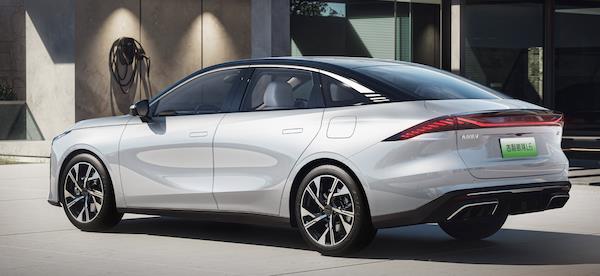Geely Galaxy "rolls" to the A-class sedan market
Recently, Geely Galaxy launched the Galaxy L6, the new car provides 60km and 125km two pure electric battery life version, the manufacturer retail price is 115,800~ 149,800 yuan, limited-time event price is 112,800~ 146,800 yuan.

The Geely Galaxy series was released in February this year, carrying the burden of the Geely brand’s comprehensive transformation of new energy. At the end of May, Geely Galaxy’s first model, Galaxy L7, was officially launched. Since its listing three months ago, the cumulative sales volume of the car has exceeded 30,000, with an average monthly sales volume of over 10,000. After Geely Galaxy initially established a foothold in the A-class SUV market with Galaxy L7, it launched Galaxy L6 non-stop, trying to seize more A-class sedan market share.
The A-class sedan market has always occupied about a quarter of the domestic car market and is the top two segment of China’s new car sales. In the past, in the era of fuel vehicles, joint venture brands firmly adhered to this position, but in recent years, independent brands have broken through with their first-mover advantage in new energy. Looking at sales in the past six months, two independent brand models, BYD Qin PLUS DM-i and GAC AION S, have advanced into the top four sales rankings, ranking second and fourth respectively.
As the second model of the Geely Galaxy series, the emergence of the Geely Galaxy L6, on the one hand, is to rely on new energy vehicles to "reduce the dimension" of traditional fuel vehicles, sniping A-class joint venture cars, such as Xuanyi, Langyi, Suiteng, Corolla, etc.; on the other hand, in the A-class plug-in car market, Geely Galaxy L6 also wants to "grab food" from BYD Qin PLUS DM-i.
However, compared with BYD Qin PLUS DM-i, Geely Galaxy L6 has a higher entry threshold. In this regard, Fan Junyi, general manager of Geely Automobile Sales Company, said in an interview with the first financial reporter that Geely Galaxy L6 is quite different from the user portrait of competing products, which is also Geely Galaxy’s way to break through the price war, that is, to fight the value war.
It is reported that before the official listing, the Galaxy L6 subscription (prepaid deposit) users have exceeded 20,000. Fan Junyi said that the market sales of Galaxy L6 are expected to be higher than that of Geely Galaxy L7. After all, in the fuel vehicle stage, Geely’s car sales are also at the forefront.
Traditional car companies such as Geely Automobile often have two major challenges in the transition to new energy vehicles, one is to develop smart electric vehicles that meet user requests, and joint venture car companies are generally more challenging in this regard; the other is that the traditional wholesale sales model is no longer applicable in the new energy vehicle market, and the change of the operating model is crucial.
For the breakout of Geely Galaxy, Fan Junyi also believes that two major factors of product and channel are needed to help, "In the first half of the year, a lot of electric hybrid products were launched in the auto market, and now only Geely Galaxy L7 has sold more than 10,000. This is largely due to the establishment of Geely Galaxy’s new channels and new ecological standards."
Geely Galaxy has adopted a new independent channel, but unlike Volkswagen’s "direct sales agency system" and Tesla’s "direct sales", Geely Galaxy has adopted the dealer agency system, relying on dealer investors to invest in building stores, while using digital management tools to create a more transparent user car purchase experience.
It is also thanks to the above channel model that Geely Galaxy’s channel expansion has been very fast. It currently has more than 450 stores and will further increase to around 700 by the end of this year.
However, this channel model also has a challenge. Fan Junyi said that the dealer agency system is not a direct sales system after all, but a third-party dealer system. Geely Automobile needs to spend more time to promote the transformation of the dealer business philosophy.